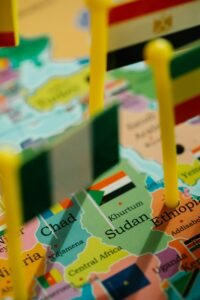 Introduction to Ethiopian Coffee Culture
Introduction to Ethiopian Coffee Culture
The Significance of Coffee in Ethiopian Culture
Ethiopia is often referred to as the birthplace of coffee, and for good reason. Legend has it that a goat herder named Kaldi discovered the energizing effects of coffee beans after noticing his goats became unusually lively after eating them. This discovery eventually led to the cultivation and global spread of coffee. Today, coffee is deeply woven into the fabric of Ethiopian life, symbolizing hospitality, community, and tradition. It’s not just a beverage—it’s a way of life.
For Ethiopians, coffee is more than a morning pick-me-up; it’s a ritual that brings people together. Whether in bustling cities or rural villages, the aroma of freshly roasted coffee beans is a constant. Sharing a cup of coffee is a gesture of friendship and respect, making it an essential part of social interactions. If you’re visiting Ethiopia, understanding this cultural significance will enrich your experience and help you connect with locals on a deeper level.
Why the Coffee Ceremony is a Must-Experience
The Ethiopian coffee ceremony is a must-experience for any traveler. It’s not just about drinking coffee—it’s about immersing yourself in a centuries-old tradition that celebrates community and craftsmanship. The ceremony is a multi-sensory experience, from the sound of beans roasting over an open flame to the rich aroma that fills the air. It’s a slow, deliberate process that invites you to pause and savor the moment.
Here’s what makes the coffee ceremony so special:
- Authenticity: It’s a genuine cultural experience that hasn’t been commercialized for tourists.
- Connection: It’s a chance to bond with locals and learn about their way of life.
- Affordability: Participating in a coffee ceremony is often free or very low-cost, making it perfect for budget travelers.
Whether you’re a digital nomad looking for a unique break from work, a solo traveler seeking meaningful interactions, or a family wanting to introduce your kids to new cultures, the Ethiopian coffee ceremony is an experience you won’t want to.
What to Expect During the Ceremony
Participating in an Ethiopian coffee ceremony is a deeply immersive cultural experience that unfolds in a series of steps, each rich with tradition and meaning. Whether you’re a budget traveler or a cultural tourist, this ritual offers a unique glimpse into Ethiopian life. Here’s what to expect from start to finish.
The Step-by-Step Process
The ceremony typically begins with the host roasting green coffee beans over an open flame. The aroma of freshly roasting beans fills the air, creating an inviting atmosphere. This is followed by grinding the beans using a mukecha (mortar) and zenezena (pestle), a process that’s often done with rhythmic precision. The ground coffee is then brewed in a traditional clay pot called a jebena, which has a distinctive round base and a narrow spout.
Once the coffee is ready, it’s served in small cups called sini, starting with the eldest or most honored guest. Ethiopian coffee is typically strong, dark, and slightly sweetened with sugar or honey. You’ll likely be offered three rounds of coffee, known as Abol, Tona, and Bereka, each with its own significance. It’s polite to accept at least the first two rounds, as declining might be seen as disrespectful.
The Role of Incense and Traditional Tools
Incense—often made from frankincense or myrrh—is an essential part of the ceremony. It’s burned in a small clay burner called a chachabesa, and its fragrant smoke is believed to ward off evil spirits and create a sacred space. As the incense wafts through the room, it adds to the sensory richness of the experience.
Other tools you’ll notice include:
- The Jebena: The clay pot used for brewing coffee, often adorned with intricate designs.
- The Sini: Small cups without handles, usually made of porcelain or clay.
- The Rekebot: A woven tray that holds the tools and is often decorated with vibrant colors and patterns.
These elements, combined with the rhythmic sounds of grinding and the warmth of the host, make the ceremony a truly enchanting experience. Whether you’re a solo traveler or a family, this ritual offers a moment to slow down, connect, and savor the essence of Ethiopian culture.
Etiquette and Tips for Participants
How to Respectfully Join the Ceremony
Participating in an Ethiopian coffee ceremony is a unique and meaningful experience, and showing respect is key. Always arrive on time or slightly early, as punctuality is a sign of respect. When you enter, greet the host warmly—a simple “Selam” (hello) or “Amesegenalew” (thank you) will go a long way. The host will likely invite you to sit on low stools or cushions, so follow their lead. Remember, the ceremony is a social and cultural event, so engage in conversation and show genuine interest in the process.
What to Wear
While Ethiopia is generally relaxed about clothing, dressing modestly during a coffee ceremony is important. Opt for comfortable yet respectful attire, such as long pants or skirts and shirts with sleeves. Avoid overly casual or revealing clothing. Keep in mind that the ceremony often takes place in a home or community setting, so dressing neatly shows appreciation for the host’s hospitality.
How to Behave During the Ceremony
The coffee ceremony is a ritual, so patience and attentiveness are crucial. Here are some tips to help you navigate the experience:
- Wait for the host to serve you: It’s customary for the host to pour and distribute the coffee. Don’t reach for the cup until it’s offered to you.
- Accept the coffee with your right hand: This is a sign of respect in Ethiopian culture.
- Enjoy the snacks: Traditional snacks like popcorn or roasted barley are often served alongside the coffee. Accept them graciously and try at least a little.
- Compliment the coffee: Ethiopians take pride in their coffee. A sincere compliment about its flavor or aroma will be appreciated.
- Stay until the end: The ceremony involves multiple rounds of coffee, so plan to stay for at least an hour. Leaving early may be seen as disrespectful.
By following these guidelines, you’ll not only show respect for the tradition but also fully immerse yourself in this beautiful cultural experience.
Where to Experience a Coffee Ceremony
Best Places in Ethiopia to Attend a Coffee Ceremony
Ethiopia, the birthplace of coffee, offers countless opportunities to experience this rich cultural tradition. Addis Ababa, the capital city, is a great starting point, with many cafes and cultural centers hosting authentic ceremonies. For a more traditional setting, head to Harar, known for its historic coffee culture and vibrant markets. In the southern region, Yirgacheffe and Hawassa are perfect for those seeking a serene countryside experience where coffee is grown and celebrated daily.
Budget-Friendly Options for Travelers
Experiencing a coffee ceremony doesn’t have to break the bank. Here are some wallet-friendly tips:
- Local cafes in Addis Ababa: Avoid touristy spots and opt for smaller, family-run cafes. These often offer a more intimate experience at a fraction of the cost.
- Village visits: If you’re traveling to rural areas, many villages welcome visitors to join their daily coffee ceremonies. A small gesture like buying a bag of coffee beans can often cover the cost.
- Cultural centers: Some cultural centers and museums in Ethiopia host regular coffee ceremonies as part of their programming. Entry fees are usually minimal, making it an affordable way to immerse yourself in the tradition.
Remember, the essence of a coffee ceremony lies in the experience, not the price tag. Whether you’re in a bustling city or a quiet village, you’ll find warmth and hospitality that make this ritual unforgettable.
The Cultural and Social Importance
How the Ceremony Fosters Community and Connection
Participating in an Ethiopian coffee ceremony is not just about drinking coffee—it’s about building relationships and strengthening bonds. This ritual is deeply rooted in Ethiopian culture and serves as a social glue that brings people together. Families, neighbors, and even strangers gather around the traditional jebena (clay coffee pot) to share stories, discuss community matters, and simply enjoy each other’s company. For budget travelers, digital nomads, or solo adventurers, this ceremony offers a unique opportunity to connect with locals and experience genuine hospitality. It’s a moment to slow down, appreciate the present, and immerse yourself in the warmth of Ethiopian traditions.
The Symbolism Behind Each Step
Every step of the coffee ceremony carries profound meaning, reflecting Ethiopia’s rich cultural heritage. Here’s a glimpse into the symbolism behind this beautiful ritual:
- Roasting the Beans: The fragrant aroma of roasting coffee beans symbolizes welcome and is often associated with cleansing the air and inviting positive energy.
- Brewing in the Jebena: The slow brewing process represents patience and the importance of taking time to nurture relationships.
- Serving Three Rounds: The three rounds of coffee, known as Abol, Tona, and Baraka, symbolize life’s stages—birth, adulthood, and death—and the blessings (Baraka) that accompany them.
- Sharing the Ceremony: The act of sharing coffee, particularly with guests, embodies unity and the value of community in Ethiopian culture.
Whether you’re a cultural tourist, a young couple, or a family traveling with children, understanding these symbolic layers will deepen your appreciation for this meaningful tradition. It’s a chance to witness how coffee transcends a mere beverage to become a celebration of life and togetherness.
Practical Tips for Travelers
How to Plan Your Visit Around a Coffee Ceremony
Participating in a traditional Ethiopian coffee ceremony is an experience that requires a bit of planning, especially if you’re on a tight schedule or budget. Best times to attend a ceremony are usually mid-morning or late afternoon, as it’s a social event often hosted by locals in their homes or small cafes. To make the most of this cultural immersion, consider these tips:
- Ask locals for recommendations: Many coffee ceremonies are informal and not widely advertised. Locals can guide you to authentic experiences, often at little to no cost.
- Allocate enough time: The ceremony can take anywhere from 30 minutes to over an hour, so plan your day accordingly.
- Bring small gifts: While not required, bringing a small token like sugar or incense is a thoughtful gesture that shows appreciation for the host’s hospitality.
Combining the Coffee Ceremony with Other Activities
Ethiopia offers a wealth of experiences, and you can easily pair your coffee ceremony visit with other activities to make the most of your trip. Here’s how:
- Explore local markets: Before or after the ceremony, visit nearby markets to shop for traditional coffee beans, handicrafts, or spices. Many markets are budget-friendly and offer a glimpse into daily life.
- Visit historical sites: In cities like Addis Ababa or Harar, combine your coffee experience with a trip to museums, churches, or historical landmarks.
- Join a cooking class: Many places offer affordable classes where you can learn to make traditional Ethiopian dishes like injera or doro wat, complementing your coffee ceremony experience.
Budget-Friendly Tips for Travelers
Traveling on a budget doesn’t mean missing out on Ethiopia’s rich coffee culture. Here are some cost-saving strategies:
- Use public transport: Buses and minibuses are affordable ways to get around cities and reach rural areas where ceremonies are often held.
- Stay in guesthouses: Many guesthouses offer affordable accommodations and may even host coffee ceremonies for their guests.
- Share the experience: Traveling with a group or joining a guided tour can reduce costs while enhancing the experience through shared insights and companionship.
For Digital Nomads and Solo Travelers
If you’re a digital nomad or solo traveler, Ethiopia’s coffee ceremony is a fantastic way to connect with locals and fellow travelers. Look for cafes with reliable Wi-Fi where you can work while enjoying traditional coffee. Solo travelers should prioritize safety by choosing well-known venues or traveling with a trusted guide. The ceremony’s relaxed atmosphere also makes it an ideal setting to strike up conversations and build connections.
For Families and First-Time Travelers
Families and first-time travelers can make the coffee ceremony a highlight of their trip. Choose family-friendly venues where children are welcome, and the pace is relaxed. For first-timers, attending a ceremony is a gentle introduction to Ethiopian culture, so don’t hesitate to ask questions or express curiosity—locals are often happy to share their traditions.
Conclusion and Call to Action
Participating in a coffee ceremony in Ethiopia is more than just a cultural experience—it’s a journey into the heart of Ethiopian hospitality, tradition, and community. This unforgettable ritual offers a rare opportunity to connect with locals, savor the world’s finest coffee, and immerse yourself in a centuries-old tradition that continues to thrive today. Whether you’re a budget traveler, a digital nomad, or an adventurer seeking authentic experiences, this is one activity that deserves a spot on your travel itinerary.
Why This Experience is Unforgettable
The Ethiopian coffee ceremony is a sensory delight. From the aroma of freshly roasted beans to the rhythmic sounds of grinding and brewing, every moment is designed to engage your senses. But what truly makes it unforgettable is the human connection. Sitting with locals, sharing stories, and sipping coffee together creates memories that last a lifetime. It’s a reminder that travel is not just about seeing new places but about experiencing new ways of life.
Add It to Your Travel Itinerary
If you’re planning a trip to Ethiopia, don’t miss the chance to participate in a coffee ceremony. Here’s why it’s worth it:
- Affordable and Accessible: Many local cafes and homes offer this experience at little to no cost, making it perfect for budget travelers.
- Cultural Immersion: It’s a chance to learn about Ethiopian traditions and connect with the community.
- Unique and Authentic: Unlike touristy activities, this is a genuine cultural practice that hasn’t been commercialized.
Your Next Step
Ready to experience this for yourself? Start by researching local cafes or homestays in Ethiopia that offer coffee ceremonies. If you’re traveling solo, don’t hesitate to ask locals for recommendations—they’re often the best guides. For families, this is a wonderful way to introduce children to new cultures in a safe and welcoming environment. And for digital nomads, it’s a perfect break from work to recharge and connect with the world around you.
So, what are you waiting for? Add the Ethiopian coffee ceremony to your travel plans and prepare for an experience that will stay with you long after your trip ends. Whether you’re a first-time traveler or a seasoned adventurer, this is one tradition you won’t want to miss.
About Grace Castle
Grace Castle, 29, is a passionate traveler and digital nomad who turned her love for exploring the world into a career. With years of experience traveling across different countries, she has mastered the art of smart travel planning, working remotely while discovering new destinations.
An expert in budget travel, local culture, and remote work, Grace shares valuable tips for those looking to travel more while spending less. Her mission is to help fellow travelers explore the world with ease, safety, and authentic experiences.
When she’s not writing about her adventures, Grace can be found discovering cozy cafés, learning new languages, or planning her next trip.


 Introduction to Ethiopian Coffee Culture
Introduction to Ethiopian Coffee Culture









